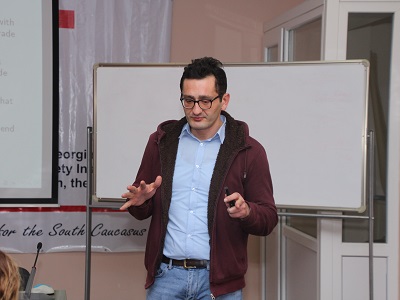One of ISET’s core values is to provide its students with an international academic environment. One of the key aspects of this mission is the academic seminars the institute periodically hosts; many outstanding scholars have visited ISET to present their research results and discuss issues in the focus of academic circles all over the world. This helps students with their studies, find their own interests, and remain up-to-date with the most recent academic trends worldwide.
It is, however, doubly special when an alumnus returns to meet his fellow ISETers. Dr. Lasha Chochua, who graduated from ISET’s MA program back in 2008, just recently defended his PhD thesis with the job market paper entitled ‘The Farsighted Stability of Global Trade Policy Arrangements’ in Bielefeld University, Germany.
According to the paper, co-authored with Stefan Berens, following the General Agreement on Tariffs and Trade (GATT) of 1947, an increasing number of signatory countries liberalized their trade policies primarily via two channels, namely bilateral and multilateral negotiations. To the present day, there have been eight rounds of multilateral trade negotiations, with the current ninth process, the Doha Round, still ongoing. At the same time, parallel to the arrangements observed at the multilateral level, the world has seen an ever-increasing number of Preferential Trade Agreements (PTAs) mainly in the wake of bilateral negotiations. Currently, about forty percent of all countries/territories are a member of more than five PTAs, while about a quarter participates in more than ten.
The analysis in the paper ultimately shows that the effect of PTAs on trade liberalization depends on the size distribution of the countries. As long as the countries are close to symmetric, Global Free Trade (GFT) emerges as the unique stable outcome under both the existing and the hypothetical institutional arrangement. However, when two countries are considerably smaller, a modified WTO without PTAs would facilitate the formation of GFT. By contrast, if two countries are relatively larger, this modified WTO would actually obstruct the development towards GFT. Once the world is further away from symmetry, full trade liberalization is not attainable at all, and abolishing the exception for PTAs might result in the worst possible state from the perspective of overall world welfare.











